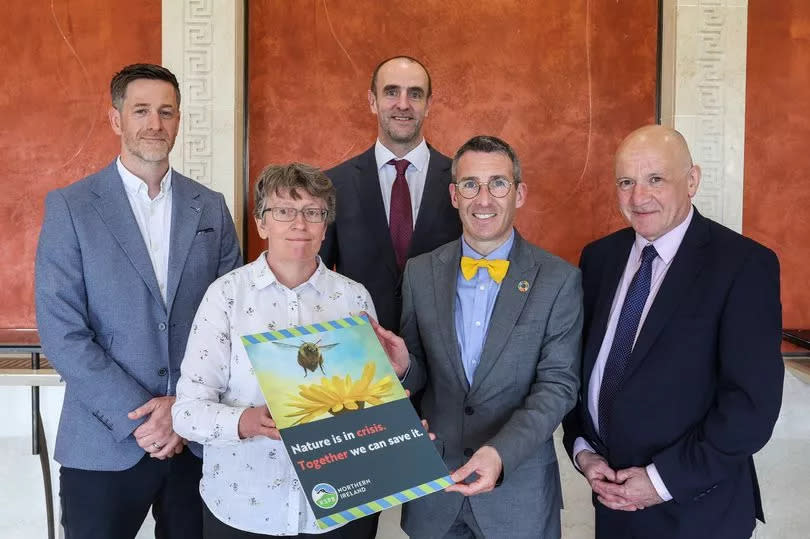Stormont urged to pass legal targets for nature restoration and protection by RSPB NI

The Northern Ireland Assembly has been urged to set legally binding targets to protect and restore nature by RSPB NI as it "is the basis for our existence". Alliance MLA Sorcha Eastwood opened their special event at Stormont's Long Gallery on Tuesday afternoon, saying "nature can't wait".
She highlighted how Northern Ireland ranks 12th worst in the world for biodiversity loss and that "Lough Neagh should be a wake up call" for all of us. It was also revealed at the event how one in nine species here are at risk of extinction, while we have no legally binding targets to protect nature and Stormont failed to deliver 35 out of 42 actions in its own 2015-2020 biodiversity strategy.
John Martin, RSPB NI policy advisor, said legally binding targets to protect and restore NI's nature are important because "we've had lot of [not legally binding] targets in the past". He added: "We had targets to stop biodiversity decline in 2010, we had more targets to stop biodiversity decline in 2020, we have more targets to stop biodiversity decline by 2030. We have targets around water quality, we have targets around air quality, but we keep missing them.
Read more: Executive decision holding up environmental plan that could help Lough Neagh
Read more: Activists take fight to 'save' Lough Neagh to Lord Shaftesbury's Dorset estate
"Targets are important because they set the ambition but if we aren't going to meet those targets... and push the resource to follow them, then what's the point?
"We obviously have a Climate Change Act now which provides legally binding targets for emissions reductions but we would like to see the same targets set but in a nature context to ensure we start to meet some of these targets around nature decline.
"People are getting fed up listening to organisations like us saying extinctions are increasing year on and year on. We can only do a certain amount... but to make the biggest difference you need to set a legal framework that benefits the most amount of land and people."
John said this issue is vitally important to ordinary folks across Northern Ireland because "nature is the basis for our existence to put it mildly. If we have no nature; we have no food, we have no jobs, we have no clean water, we have no clean air.
"I think we all kind of take that for granted... and think nature will always be there and it will always keep doing what we need it to do but we have seen more recently through more extreme climatic events how nature can overwhelm us.
"As more extinctions start to happen amongst species that were once common in Northern Ireland, we are moving closer towards a tipping point when the natural systems that keep us alive will start to function in a way that is more difficult for us to survive.
"It has a real impact on our economy as well. A report cited earlier from the Green Finance Institute said that nature's [decline] both in the UK and globally is going to have a 12% negative impact on our GDP, which is worse than the global financial crisis and Covid-19.
"There is a clear imperative economically, socially and environmentally to improve nature for everyone's benefit."
RSPB NI trustee and advisory committee chair Ruth Arnott said "we would want 30% of the land to be well managed for nature... but we have a long way to go."
When existing targets are not being met, she added: "At the moment I think we shrug."
Ruth Chambers OBE, a senior fellow with environmental think tank Green Alliance, who played a key role in environmental coalition Greener UK which was at the heart of the environmental community's response to Brexit says "transparency is key to good governance".
She highlighted how the UK public widely support legally binding targets for nature and urged the Westminster Government to set even more ambitious ones - which it ignored. Ms Chambers added: "Committing in law to a clear target to restore nature, with binding milestones along the way, would be a genuine sign that the government is committed to improving Northern Ireland’s environment for future generations.
"It's not just about nature, it's about us as people."
Paul Armstrong from the Woodland Trust NI told us: "It's important that we plant more trees. Northern Ireland is the least wooded area of the UK and Ireland.
"Ancient woodland is one of the most species rich habitats we have... and 0.04% of Northern Ireland's land is ancient woodland so for nature's recovery... we need to do more to look after the trees that we have.
"We would love to see targets for ancient woodland restoration across Northern Ireland and 3,000 hectares of long established woodland to be in restoration by 2030 and if that was a legally binding target it would drive the funding to do it... which will cost around £21 million."
Ancient woodland is defined as woods in place since the 1600s, while long established has been around since the 1800s. Currently just 9% of NI is covered in trees and while we "have targets for increasing tree cover" Paul says we need to plant the right trees in the right places.
Department for Agriculture, Environment and Rural Affairs Minister, Andrew Muir, also spoke at the event. He told us: "The discussions here in terms of nature restoration are absolutely key. I want to be able to continue with them over the times ahead in terms of what we can do together."
In terms of legally binding targets and strategies, he added: "We are working on that. I know there's s consideration of a primate members bill... and I will engage with the member on that."
For all the latest news, visit the Belfast Live homepage here and sign up to our daily newsletter here.

 Yahoo News
Yahoo News 
